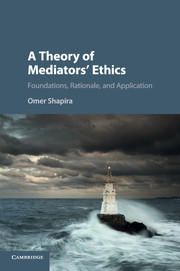Book contents
- Frontmatter
- Dedication
- Contents
- List of figures
- List of tables
- Preface
- Abbreviations of codes of conduct
- PART I A theory of professional ethics
- PART II A theory of mediators’ ethics
- PART III Dealing with ethical problems
- 15 Ethical decision-making
- 16 Case illustrations
- Appendix I A proposed model code of conduct for mediators
- Appendix II Model standards of conduct for mediators (2005)
- Bibliography
- Index
15 - Ethical decision-making
from PART III - Dealing with ethical problems
Published online by Cambridge University Press: 05 March 2016
- Frontmatter
- Dedication
- Contents
- List of figures
- List of tables
- Preface
- Abbreviations of codes of conduct
- PART I A theory of professional ethics
- PART II A theory of mediators’ ethics
- PART III Dealing with ethical problems
- 15 Ethical decision-making
- 16 Case illustrations
- Appendix I A proposed model code of conduct for mediators
- Appendix II Model standards of conduct for mediators (2005)
- Bibliography
- Index
Summary
Introduction
Parts I and II laid down a theory of professional ethics, applied it to the role of mediators, and extrapolated a reasoned list of ethical standards to regulate the conduct of mediators. Chapter 3 posited the foundations for analyzing ethical problems in mediation, providing a prism for understanding the content and meaning of the ethical standards that apply to mediators, drawing attention to the coexisting relationships that mediators have with the mediation parties, the mediation profession, the public, and sometimes an employer or principal, and pointing to the mutual influence that the standards exert on one another following these relationships. Chapters 4–14 elaborated on the meaning and content of mediators’ ethical standards, demonstrating the process for ascertaining the standards’ meaning and content, and yielding a Proposed Model Code of Conduct for Mediators.
Part III takes this project a step further. It seeks to demonstrate how these standards can be utilized by mediators in the practice of mediation. The exercise of the mediator's role necessitates decision-making by mediators. Decisions have to be made with respect to various aspects of the process, such as the time and place of the mediation, types of interventions, postponement, withdrawal and termination, information disclosed to parties and nonparties, and so on. These decisions can be evaluated through the lens of professional ethics, so that the ethical norms provide behavioral guidelines for mediators.
The present chapter describes, in general terms, what ethical decision-making is, in order to provide mediators with tools for making ethical decisions. It stresses the importance of ethical sensitivity, elaborates on the features of easy and hard cases or questions in mediation, and provides mediators with an ethical decision-making procedure for making decisions in both “easy” and hard cases. The next chapter then takes a more concrete and contextualized approach and demonstrates how the theory of mediators’ ethics and ethical decision-making can be applied to various scenarios that raise ethical questions for mediators.
On ethical decision-making
Ethical decision-making is a process by which decisions or choices are made on the basis of ethical norms. It should be a rational and informed process, based on reflection, careful consideration of facts and norms, and logical application of the relevant norms to factual situations. Intuitions are important for the purpose of making ethical decisions, but must not be allowed to replace reasoned judgment and consistency.
- Type
- Chapter
- Information
- A Theory of Mediators' EthicsFoundations, Rationale, and Application, pp. 343 - 363Publisher: Cambridge University PressPrint publication year: 2016



